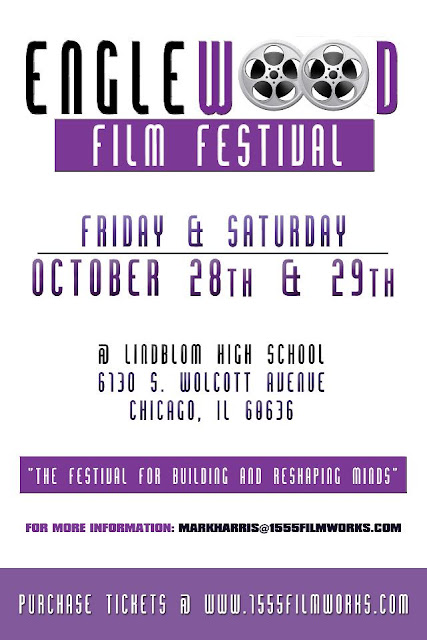Filmmaker struggled to put on 'dangerous' Englewood film fest
by Mark Konkol Staff Reporter for the Chicago Sun-Times
October 31, 2011
Filmmaker Mark Harris knows outsiders fear his neighborhood.
Filmmaker Mark Harris knows outsiders fear his neighborhood.
“The reputation Englewood has — it’s one of … it’s the worst community in Chicago,” he said. “And people who aren’t from Englewood don’t want to come here because they fear for their lives, which we can all understand. Englewood is dangerous. We all know that.”
But the thing is, folks still live there. They’re not all criminals. They even have fun sometimes. And get this, Harris said: They like movies, too.
Harris, who lives in Englewood just a few blocks from where he grew up, says his neighbors need — heck, deserve — reminders that there’s hope amid all the hopelessness and despair.
More than anything, that’s what inspired the 39-year-old to organize the inaugural Englewood Film Festival, two days of movies and seminars that ended Saturday with a screening of “The Interrupters,” a documentary about Chicago’s urban “violence interrupters” that was filmed in the neighborhood.
“If you want to be an example, because really this is about the children of Englewood, you have to show people something different, a different attitude that they haven’t seen,” Harris said. “If we can change collectively that condition of people in Englewood, how can that change Chicago as a whole?”
But change doesn’t come easy, not in such a hardscrabble place.
Harris, a Tilden High School graduate who has produced, written or directed more than 10 movies including “Show Stoppers” and “I Used to Love Her,” sent letters to all 50 aldermen, passed out fliers, solicited businesses and non-profits and even asked certain celebrities who came from Chicago’s toughest neighborhoods for support. He asked friends and business associates to donate their time or cash or at least buy tickets in advance. The festival needed financial backing, of course, but what Harris wanted most was for city and community leaders to be either festival partners or pledge to show up.
Harris got nice letters from Mayor Rahm Emanuel and Gov. Pat Quinn. And that’s it.
It was like he was trying to create “The Most Dangerous Film Festival in the World.”
“I got more encouragement from brothers on the corners with sagging pants and white T-shirts than anyone in the political community,” Harris said. “They seemed excited. They said, ‘Continue to do your thing.’ ”
So he did.
The only two organizations that had agreed to be festival sponsors backed out.
Advance ticket sales were slow and Harris couldn’t convince folks at the original location, Kennedy-King College, to reduce rental fees. “They would not give us one free seat. Nothing at all,” Harris said.
Harris considered canceling the festival, but his partner on the project, Khadeejah Tasheen, insisted he didn’t give up.
“There were no sponsors,” Harris said. “Well, Reggio’s gave us three pizzas. I had to beg for that because I’m broke. My staff needed to eat.”
Harris says the lack of response, even from people he considers friends, sends an alarming message: “They don’t think there’s any hope for Englewood.
“Sponsors look at a film festival and don’t think the people of Englewood will support something like this. They don’t think people on the outside will either. They don’t want to attach their brand to an event like this if they think something, something violent, may happen,” he said. “That was my struggle.”
And for Harris that led to moments of doubt.
“I started asking myself, ‘Why are you doing this?’ ” he said. “And the truth is I don’t know why sometimes.”
With two weeks to go, Harris relocated the festival to Lindblom Math and Science Academy at 62nd and Wolcott. After hearing about the festival’s troubles from a parent, Lindblom Principal Alan Mather agreed to rent the auditorium to Harris at cost.
“We have the most beautiful auditorium in the city. It’s a gorgeous space and should be used, and sadly, it’s underutilized,” Mather said. “If [newspapers] only produce statistics of violence then that’s all people will think Englewood is going to be. There are wonderful things and wonderful people in Englewood.”
The festival had a new, affordable home. Harris made the right choice. If you don’t give up, you don’t have regrets.
“What took place leading up to the festival, I wouldn’t change a thing,” he said. “It taught me about myself. Yeah, I wanted to strike back when I didn’t get support … but you know there has to be something greater than our ego and something greater than our anger. It taught me a lot of patience and a lot of discipline to do what’s best … and not just what’s best for my own emotions.”
The Englewood Film Festival opened on Friday night.
There were no banners hung outside the entranceway to Lindblom — a Classical Revival-style building built in 1919 with city landmark status that is across the street from four boarded-up houses.
The festival programs were printed on plain, white paper. And there was no red carpet to walk. Instead, those in attendance, more than 200 people, walked past disconnected metal detectors to the auditorium screening room.
It wasn’t fancy. It wasn’t a sellout. But Harris says he could see the weekend for what it was: a success.
Think about it. Englewood — the place better known as a murderous, drug-dealing, gangbanging hellhole on the South Side — was home to its own artsy, independent film festival.
No one was shot — and people had fun.
Harris says he’s ready to do it again next year. He doesn’t think it will be such a struggle.
 |
| Filmmaker Mark Harris, founder of the Englewood Film Festival. Photo by Brian Jackson/Chicago Sun-Times. |







0 comments:
Post a Comment